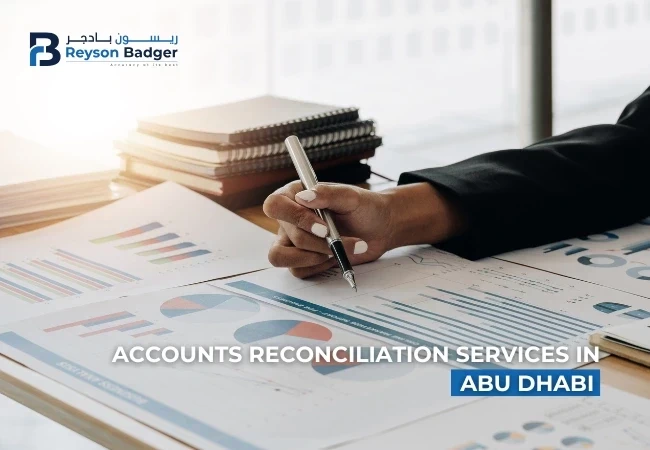
Abu Dhabi's business markets are rapidly growing, increasingly globalized, and held to high regulatory standards. Accurate accounts reconciliation in such a convoluted financial situation has now become integral to efficient financial management. In this way, financial accounts are said to be correct, current, and compliant with the regulatory guidelines, thereby reducing all kinds of risks, optimizing the flow of cash, and making wise decisions strategically.
However, it is also a challenge in terms of account reconciliation. The processes are pretty intricate, especially for SMEs or those that deal with the complexities of international trade. This creates a growing need for professional reconciliation services, as companies will require expert advice to authenticate data. For the industries in Abu Dhabi, where precision and transparency hold much value, account reconciliation plays an unavoidable role.

What Are Accounts Reconciliation Services?
Account reconciliation services refer to processes that ensure that the records of transactions made within an organisation's internal accounts are consistent with the same information obtained from external sources, for example, banks, credit card companies, or vendors. The key to reconciliation lies in figuring out and solving any inconsistencies, omissions, or inaccuracies.
Account reconciliation compares two sets of records (normally, it is the internal financial records versus the external statements) to see that indeed they agree and are accurate. This verifies that money going out of the account can be reconciled with the real expenditures and that all money coming in is correctly accounted for. Periodical reconciliation prevents fraud or errors as well as ensures statements' reliability.
It is a process that compares an organisation's bank statement with its internal cash records. It means that the cash balance in the general ledger should be the same as the one shown in the bank account after all adjustments such as outstanding checks, deposits in transit, and bank fees or interest earned.
In this type of reconciliation, credit card transactions in the company's financial system will be matched with the monthly statement issued by the credit card issuer. In the process, all the purchases, payments, and fees are accounted for.
Generally, reconciliation among vendors is a comparison between the recordable payable of a company and the statements of the vendor. Here is how it all plays out. All invoices, payments, credits, and adjustments are ensured to be accounted for without any omissions or duplications.
Customer reconciliation refers to the matching of accounts receivable records of a company with payments received from customers. It can essentially confirm that all sales, payments, and credits are actually recorded appropriately; no invoices should have been left unpaid or incorrectly recorded.
The principal function in reconciliation is the comparison of data from two sources, including the comparison of internal records with bank statements or vendor/customer accounts. The adjustments must be identified and explained.
Some transactions will not show up outside the statement at the same time because of timing differences such as outstanding checks or unposted deposits. Reconcile these.
All the differences in a reconciliation, such as missing transactions, duplicate entries, or wrong amounts, must be flagged for further research.
Corrective actions following the discovery of discrepancies include correcting the records, sending follow-up communication with either the banks or customers and correcting data entry mistakes.
Reconciliation should be well-documented, indicating how discrepancies are addressed. This will enable accountability and allow tracing in case of an audit later on a partnership with competent reconciliation practitioners would create a big difference in enriching financial governance and guaranteeing lasting sustainability.
Abu Dhabi accounts reconciliation services enable a company to have accurate and up-to-date financial records. Reconciling the financial statements with some external data, mainly bank and a vendor statement, every month will be able to detect discrepancies and correct them. This is a prerequisite for both decision making and the credibility and trust stakeholders have with management.
Sound reconciliation will support accurate and timely financial reporting. It is an essential approach when meeting regulatory compliance as well as tax in Abu Dhabi. Continuous reconciliation enables the financial statement of a company to reflect its real financial position, thus enabling it to adhere to the regulations set by authorities such as the Abu Dhabi Department of Economic Development (ADDED) and the Federal Tax Authority (FTA).
Regular reconciliations help identify and prevent fraud through the detection of untoward and unauthorized transactions in the accounts of a company. This also reduces the risk of human error like duplicate entries or missed payments, which ensures that all financial information pertaining to the company is correct.
With accurate and reconciled financial records, businesses in Abu Dhabi can make better decisions. Adequate financial data helps the management of the business understand cash flow, control expenses, and make strategic investments in the company. This should aid a company to forecast and budget, which means that it can grow in a competitive market.
Strict Regulatory Environment:
Accuracy in Financial Reporting:
Importance for SMEs:
Importance for Large Corporations:
Tax Compliance:
Fraud and Error Prevention:
Regulatory Compliance:
Business Stability:
Steps for Proper Accounts Reconciliation
Step 1: Acquiring Financial Information within and outside the organisation.
Step 2: Compare Internal Records with External Statements
Step 3 Examination of Discrepancies and Errors
Step 4: Reconciliation and Reporting of Reconciled Accounts
Cost Savings and Efficiency
Access to Expertise and Advanced Financial Tools
Focus on Core Business Operations
As the company is aware of the local financial regulations in Abu Dhabi and uses sophisticated financial tools that simplify reconciliation, the most suitable company in this regard is Reyson Badger. Customized solutions could be given to different businesses of any size to help in accuracy while adhering to Abu Dhabi's regulations. Reyson Badger is very reliable, saving costs for businesses that need to incur maintenance in-house, and financial teams. In addition, dedicated client support ensures that discrepancies are resolved promptly, making it a trusted partner in achieving financial accuracy and efficiency.
As the company is aware of the local financial regulations in Abu Dhabi and uses sophisticated financial tools that simplify reconciliation, the most suitable company in this regard is Reyson Badger. Customized solutions could be given to the different businesses within any size to help in accuracy while adhering to Abu Dhabi's regulations. Reyson Badger is very reliable, saving costs for businesses that need to incur maintenance in-house, and financial teams. In addition, dedicated client support ensures that discrepancies are resolved promptly, making it a trusted partner in achieving financial accuracy and efficiency.